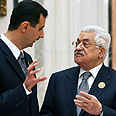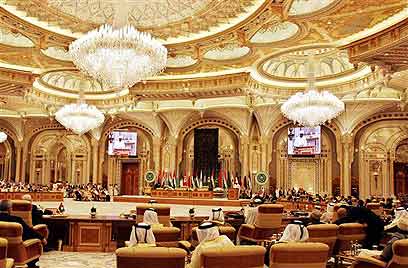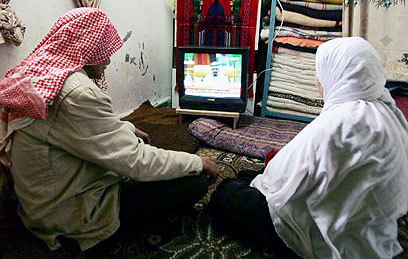
Arabs decide to revive peace plan
Leaders meeting in Riyadh unanimously decide to revive initiative adopted at Beirut summit. Meanwhile, Defense Minister Peretz suggests Israel propose its own peace initiative in Riyadh
Arab leaders meeting in Riyadh on Wednesday unanimously decided to revive a five-year-old plan for peace with Israel and launch a diplomatic offensive to resolve the Middle East conflict.
A resolution reaffirming their commitment to the Saudi-inspired peace plan was adopted by the Arab League heads of state on the first day of their annual summit in the Saudi capital, ministers said.
The blueprint offers Israel full normalisation of relations if it withdraws from all land occupied in the 1967 war and allows the creation of a Palestinian state and the return of Palestinian refugees.
During the summit, Saudi King Abdullah said that the blockade on the Palestinian Authority must be lifted. The king called on the Arab leaders who took part in the summit to overcome their disagreements and reach unity regarding the Arab stance on Iraq and Lebanon and the Palestinian issue.

Arab summit in Riyadh (Photo: AP)
Egyptian Foreign Minister Ahmed Abul Gheit confirmed to AFP that the heads of state adopted all resolutions submitted by their foreign ministers, including relaunching the peace plan.
In the resolution, a copy of which was seen by AFP, the Arab leaders "reaffirm the commitment of all Arab states to the Arab peace initiative as approved at the Beirut summit in 2002 in all its elements."
They also "reaffirm their call to the government of Israel and all Israelis to accept the Arab peace initiative and seize the opportunity to resume the process of direct and serious negotiations on all tracks."
Many guest from across the world are taking part in the Saudi summit, including EU foreign policy chief Javier Solana, who called on the Arabs to be flexible and said that the peace initiative was the basis for negotiations in the region.
Peretz: Israel should propose its own peace plan
Defense Minister Amir Peretz reiterated Wednesday that the Saudi initiative should be seen as a base for Israeli-Palestinian negotiations.
Peretz said, however, that certain clauses in the initiative, such as the right of return for Palestinian refugees, constitute a red-line which cannot be accepted. He suggested instead that Israel to propose its own peace initiative at the Arab League summit in Riyadh.
"We must show courage and be willing to negotiate a permanent agreement. This will completely change the rules of the game and offer the Palestinians a political horizon which will neutralize extremist Arab figures, it will allow moderates to unite and reach an understanding with Israel. We must not forget that they have an interest to keep radical forces from leading the Arab world," said Peretz.
Peretz, speaking at conference marking 40 years since the Six Day War, also said that the 1967 borders are the slide rule according to which Israel will align itself.
"We should, today with the perspective of 40 years time, do a serious examination and ask ourselves whether the celebrated victory of 1967 was a blessing or a curse.
Their interest is not only in relations with Israel, they have an additional interest, just as important, and that is the threat they sense from Iran. And here we can use this as leverage for dialogue. "

Family in Gaza follows reports from Riyadh (Photo: Reuters)
Foreign Minister Tzipi Livni welcomed the recent developments in the region.
In a meeting with Foreign Ministry workers in order to conclude US Secretary of State Condoleezza Rice's visit to the region, Livni said that "in spite of the complex diplomatic situation, we found a common denominator reflecting the aspiration to advance the diplomatic process, while maintaining Israel's essential interests.
"There are risks and disappointments here, particularly in terms of the Palestinian side's conduct, but this is the important agreement from Rice's visit: Launching a dialogue on the essence of the Palestinian state, subject to the Road Map stages."
"Lacking a possibility to advance the permanent agreement under the existing conditions," Livni continued, "We located the common denominator for us, the Palestinians, the moderates in the Arab world and the international community – one that also advances Israel's essential interests.
"In any scenario, the results of the process should be an independent Palestinian state which does not endanger Israel. The discussion of the characteristics of the Palestinian state now advances the chance to reach an agreement and gives Israel an opportunity… And all this, without conceding the demand to implement all stages of the Road Map," the foreign minister said.
Vice Premier Shimon Peres also addressed the peace plan Wednesday afternoon, saying that "there are disagreements between us. The question is how to overcome them – through dictations and force, or negotiations?
"They will come with their stances and we will come with ours. We will discuss them and reach an agreement, like we did with Egypt and Jordan," he said.
In Jerusalem, Peace Now activists demonstrated outside the residence of Prime Minister Ehud Olmert, demanding that Israel accepts the Arab initiative. The activists waved the flags of the 22 Arab countries taking part in the summit, including Syria, Lebanon and Iraq.
Hanan Greenberg contributed to the report










